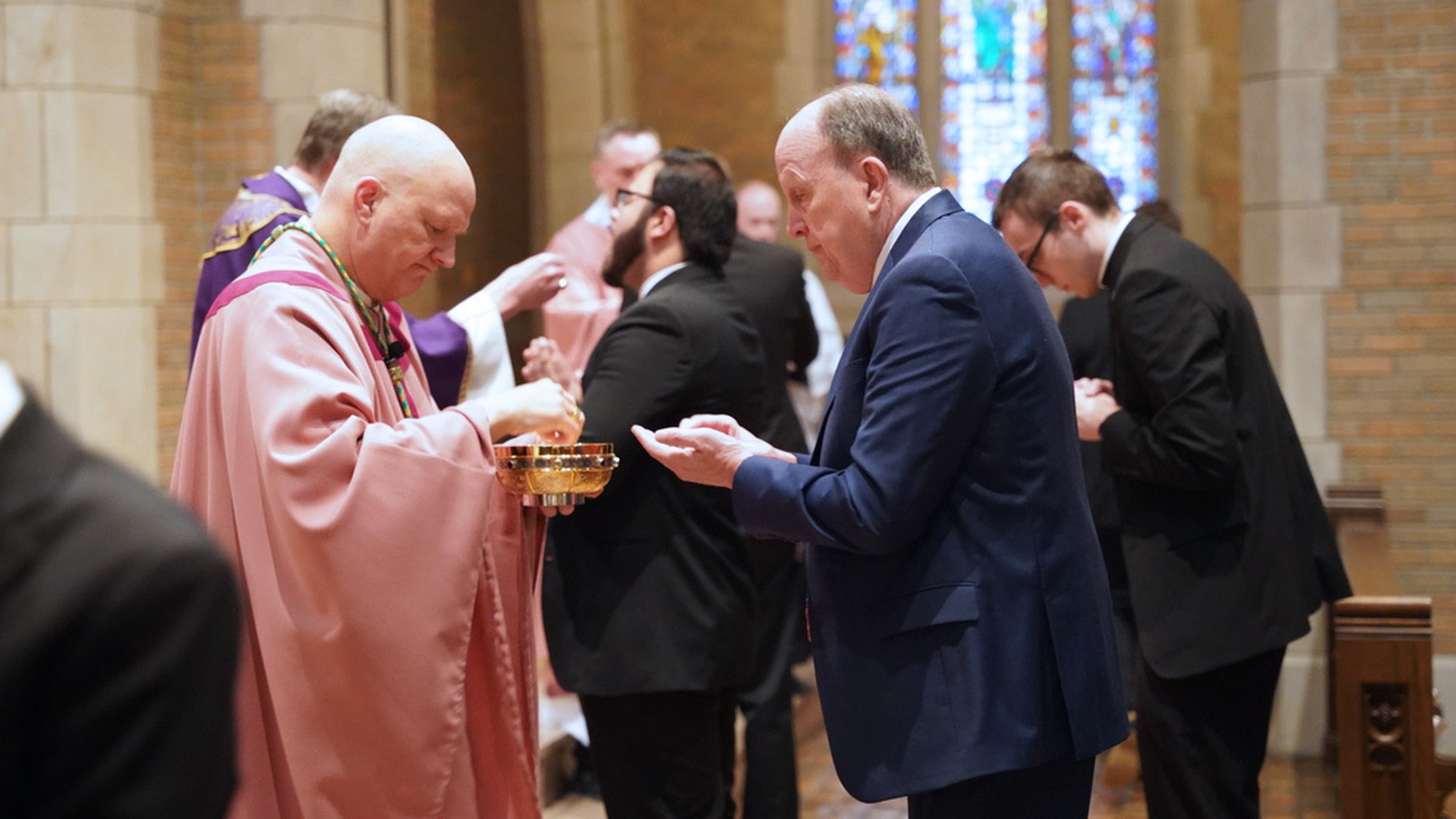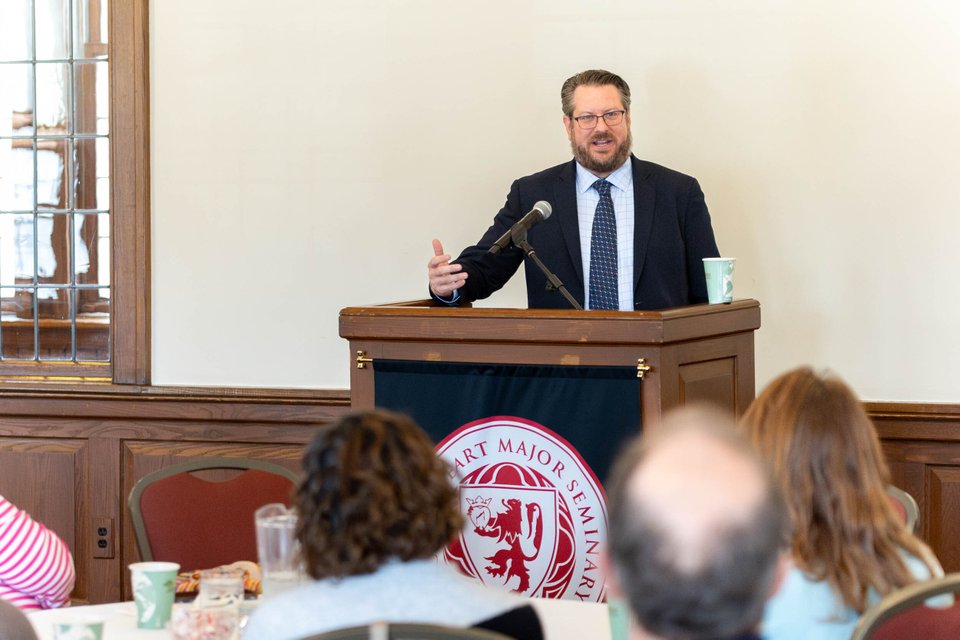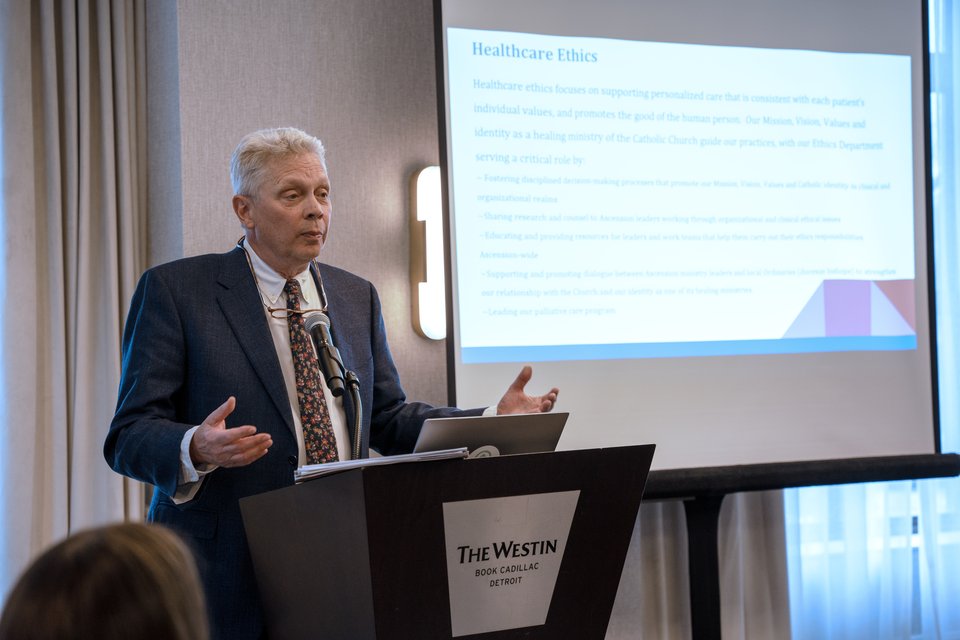Local medical community gathers for Mass with Archbishop Weisenburger; physician gives lecture on modern ethical challenges
DETROIT — Hundreds of Catholic health care workers gathered March 30 at Sacred Heart Major Seminary to give God thanks for their work in the medical field during the annual Rose Mass celebration with Detroit Archbishop Edward J. Weisenburger.
The fourth Sunday of Lent is known as Laetare Sunday, or “Rejoice Sunday,” taken from the liturgy’s Introit, “Rejoice O Jerusalem; and gather round, all you who love her; rejoice in gladness, after having been in sorrow; exult and be replenished with the consolation flowing from her motherly bosom.”
Laetare Sunday is a joyous celebration in the midst of the usually somber Lent, during which the celebrants wear rose vestments as the Church eagerly awaits the Easter celebrations.
In the Archdiocese of Detroit, the Mass is also traditionally an occasion to give God thanks for the ministry of those in health care and to commend them for their work in aiding the sick.
“It’s blessed time for all our fellow health care professionals to experience a Mass with the archbishop and the seminarians in this reverent atmosphere,” Dr. Brad Merrelli, a family medicine physician with Henry Ford Health-Rochester and Corewell Health-Troy and a parishioner at St. Mary of the Hills in Rochester Hills, told Detroit Catholic.
In his homily, Archbishop Weisenburger said health care workers have a special grace to bring the presence of Christ to those who are ill, fulfilling their call to be “leaven in the world.”
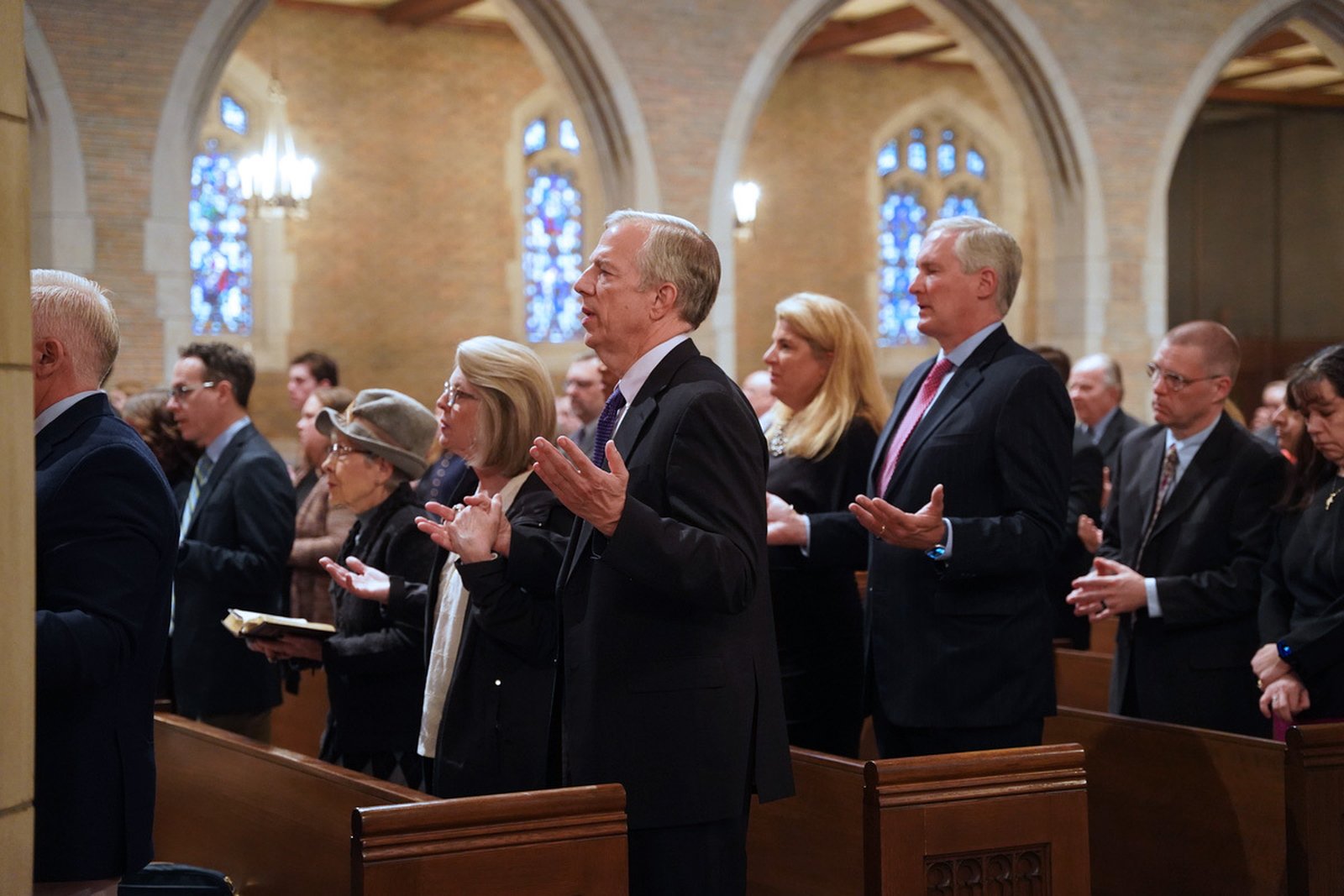
"That’s why we’re gathering here today, and that’s what we pray for. We are blessed by your efforts; may you be blessed by our prayers,” Archbishop Weisenburger told the medical professionals gathered.
The liturgy's readings included the Parable of the Prodigal Son from St. Luke's Gospel, which was Jesus' response to the scribes and Pharisees who rebuked him for communing with sinners.
Archbishop Weisenburger said the parable was hard to accept for the people who first heard Jesus preach it. Today, he said, it continues to challenge the faithful to reflect on God’s immense love for sinners and those considered outsiders.
“When we pray like this, in the parable, we can insert ourselves in the shoes of the older son and think, 'When have I been scandalized by who has been let into the kingdom of God?'" Archbishop Weisenburger said. “We have a proper Father; let us have that parable sink in.”
Dr. Merrelli said health care professionals have a unique ability to work with those on the peripheries who often feel overlooked, especially when they are going through difficult moments in life such as a serious diagnosis, chronic pain or physical therapy.
“We have the ability to touch different people who are going through difficulties in their lives and bring Jesus and a sense of joy and some peace in a time of distraction and challenge,” Dr. Merrelli said. “As physicians, we can build a rapport with people that most people don’t have the opportunity to do. It’s a great blessing to do this.”
After Communion, Archbishop Weisenburger invited all who work in health care to recite an adapted vision of the Oath of Hippocrates to administer health care to the best of their abilities through the prism of the Christian understanding of preserving, promoting and defending the respect for human life.
The Mass was followed by a lecture by Dr. John Damiani, M.D., a urologist with ProMedica Monroe Regional Hospital who also serves as president of the Detroit Catholic Medical Association and chairman of the Christus Medicus Foundation.
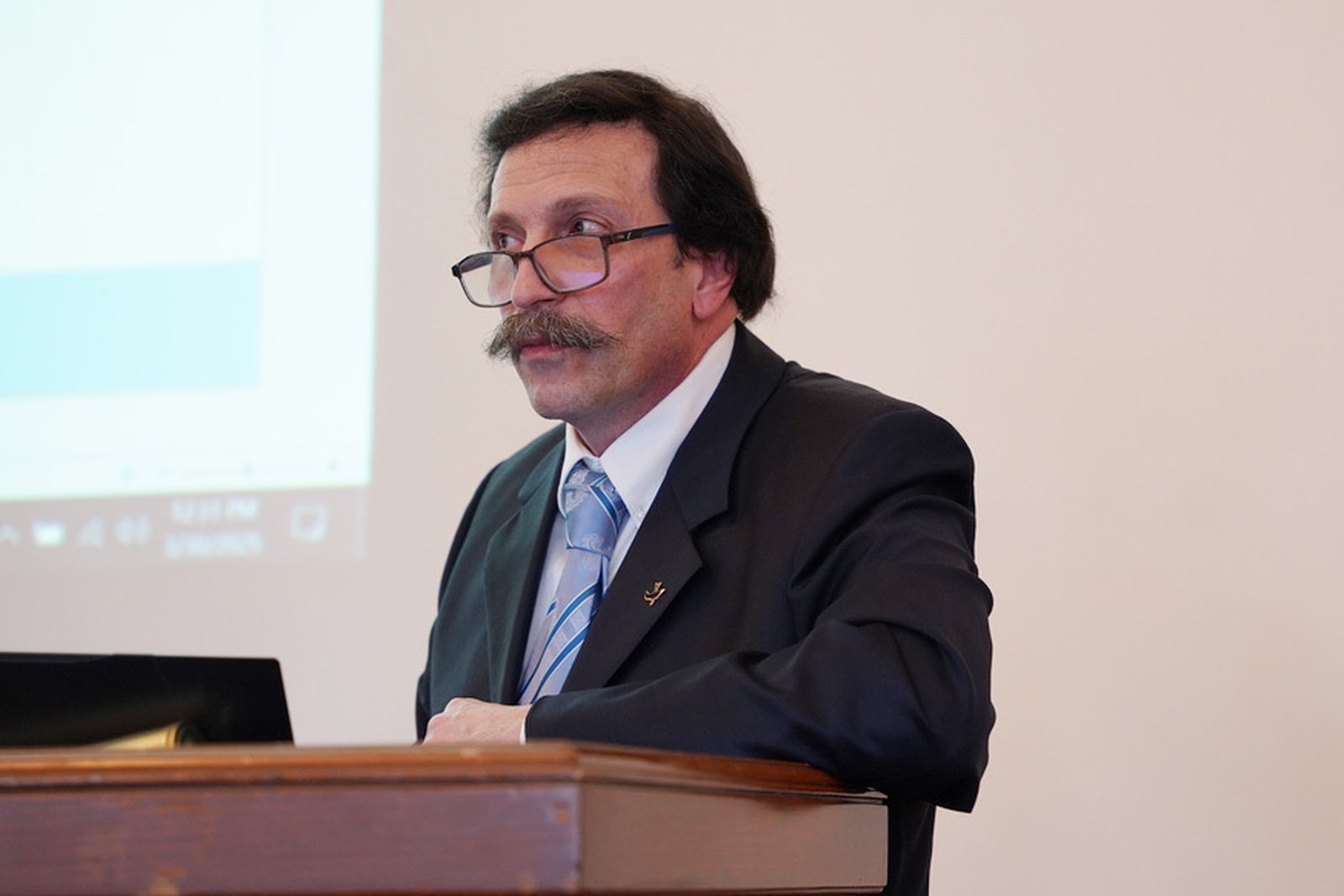
In his talk on transhumanism and artificial intelligence in the medical field, Dr. Damiani warned that many leaders in artificial intelligence innovation are operating from a school of thought devoid of a Christian understanding of intelligence, creation and — from a medical standpoint — what it means to heal.
"Transhumanism," a philosophy that seeks to use technology to radically enhance human capabilities, poses particular ethical and moral challenges, Dr. Damiani said.
Some futuristic advancements and aspirations put forward by the transhumanist movement include developing technology to allow parents to select the genetics of their unborn children, the idea that death can be overcome by uploading one's brain to simulate immortality, and even the creation of a supercomputer to make policy decisions to guide civil society "better" than a human could.
All these ideas, Dr. Damiani said, are rooted in a code of ethics that is devoid of a Christian understanding of the human condition, which leads to disastrous results, particularly in the medical field.
“If you look at everything that transhumanism is involved with, they are trying to give an alternate response to the consequences of original sin — disease, the need to work, to give birth in pain, and finally, even death and mortality are to be overcome,” Dr. Damiani said. “This gives way to a different pathway to 'salvation,' through its own alternate deity.”
Dr. Damiani said physicians, nurses and all people of faith in health care must be bold in proclaiming the Christian worldview surrounding life, death, healing and care, a message that will be increasingly counter-cultural in a secular world.
“When we see a loss of faith in the world, we see an increase in people gravitating toward these solutions because they have no faith in the resurrection, in the afterlife,” Dr. Damiani said. “And when there is a loss of faith, there is a loss of a sense of life. We’re developing technologies so people can live to 150 years old, but I’m not necessarily better to be 150 years old; I think it’d be a nightmare to live to 150. But I’m a Christian, and I know this is not the end. We know this is not the end, and that’s the message we need to proclaim.”
Copy Permalink
Catholic health care


